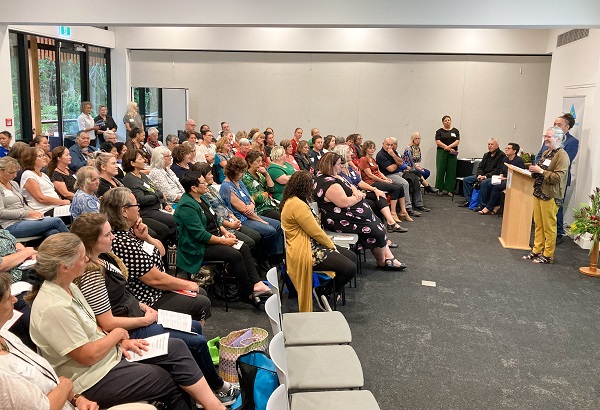Meetings & events
Symposium helps Northland nurses tackle diabetes and heart disease
Primary care nurses from across Tai Tokerau are better placed to support people who live with diabetes and heart health conditions after a dedicated symposium held at the new Tahuaroa Function Centre in the Waitangi Treaty Grounds on Saturday 10 April.
Led by Northland primary health entity Mahitahi Hauora, the symposium was specifically designed for nurses in primary care to help them develop their skills and knowledge to improve outcomes for patients with long-term conditions.
Mahitahi Hauora Nurse Director Josephine Davis said the response had been overwhelming.
“We had 95 nurses representing general practices and Māori health providers from all over Tai Tokerau, with 50 registrations in the first four days alone. And this is a symposium by nurses, for nurses – so we had 120 nurses there in total, counting our presenters and planners. That’s a huge response. Most of these nurses gave up their own time in the weekend to be there,” she said.
She said the planning team at Mahitahi Hauora had seen an opportunity to support primary care nurses with skill development in tackling diabetes and heart health.
“Northland has some of the worst diabetes and heart health outcomes in New Zealand, particularly among Māori. Nurses were asking for support in this area.”
The symposium opened with a mihi whakatau, followed by comment from Northland District Health Board Chief Nurse Maree Sheard about power relations and their impact on primary care nurses.
“What day of the week is it that you’re coming here to have your professional development? Saturday. Is this a working day for you? No, it isn’t.”
Ms Sheard explained how what is a seemingly natural order of things, such as nurses undertaking professional development activities in their free time, needs to be examined to reveal hidden assumptions. On the one hand, Ms Sheard explained, sacrificing personal time away from non-work obligations and whānau to learn about what can be put into practice on Monday, may be a pattern of expectation that is reinforced each time it is repeated. On the other hand, it presents as resistance to the status quo. This is because professional development actually gives nurses the knowledge to recognise systems that work to prevent nurses from challenging expectations.
Ms Sheard urged nurses to step forward as leaders.
“What we need are leaders stepping forward who have the knowledge and the confidence to be able to say ‘I can do this’. Just because we haven’t had in the past an expectation placed on us and we haven’t believed that we’d be able to do this, we can now. This is our time. We can step up. But we need to have that knowledge, the confidence and the frameworks to support us,” she said.
“The way to get ahead is through knowledge and education and having the confidence to take that step forward.”
An interview with a Māori man about his experience as a patient with type 2 diabetes gave the day a grounding in the perspective of a patient.
Presenters from Northland DHB, Mahitahi Hauora, Bay of Islands Podiatry, Procon and Hokianga Health then took nurses through an in-depth look at the Predict Tool, which is used in primary care to screen and manage patients with diabetes and heart conditions.
The symposium rounded off with Mahitahi Hauora Nurse Director Hemaima Reihana-Tait speaking about mauri ora, connecting and building a rapport with patients.
“We wanted to give nurses skills they could put into practice immediately to benefit patients,” said Ms Davis.
The symposium was the first dedicated primary care nursing symposium in Northland to focus specifically on diabetes and heart health.
